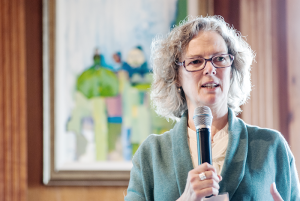Common Ground Health’s goal it to bring together leaders from several sectors to develop strategies for meeting the region’s health needs
By Ernst Lamothe Jr.

A name change in any organization can mean a paramount shift in philosophy or re-branding.
The Finger Lakes Health Systems Agency, one of the oldest Rochester healthcare organizations, has changed its name to Common Ground Health. The nonprofit, which has been a staple in the area since 1974, is rebranding to better reflect its mission to help the region find common ground and bring together organizations on healthcare issues. However, officials want the community to know it’s a name change for practical and common sense reasons and does not affect the overall services the organization has offered for decades. In fact, they are looking to expand services in the future.
“Our mission remains unchanged. The reason for the name change is to better match the name to the overall work we do at this time,” said physician Thomas Mahoney, chief medical officer for Common Ground. “We have more than 40 years that we have focused on bringing people and organizations in health care together. Our new name fits that model. And to be honest the Finger Lakes Health Systems Agency isn’t a name that people often easily remember.”
Today, Common Ground Health brings together leaders from health care, education, business, government and other sectors to develop strategies for meeting the region’s health needs. From caring for our aging populations to preventing lifestyle diseases like high blood pressure and obesity, the organization works with key decision-makers to meet a growing list of fundamental needs for the Rochester region and beyond.
“Many of our health problems are too large and complex for any one organization to solve alone,” said Trilby de Jung, CEO of Common Ground Health. “We provide the community table and data analysis that allow decision-makers to tackle health challenges together. That collaboration has led to improved care, costs, and outcomes for residents in our nine-county region.”
The agency, which employs 41 people, has been lauded by Gov. Andrew Cuomo as the hub of a reviving regional health planning infrastructure. In 2012, Common Ground Health, with the support of partners from across the community, was awarded the nation’s largest Centers for Medicare and Medicaid Innovation grant.
Some of the initiatives that Common Ground has already accomplished include improving nutritious school lunch choices and physical activity for students, collaborating with barbershops and churches for blood pressure awareness and working with neighborhood groups to have safe playgrounds around the city.

“Common Ground has an amazing ability to bring together partners from diverse areas of work and find common ground to find what is necessary to transform health in ways that will best serve our community,” said Martin Teller, executive director of Finger Lakes Addiction Counseling and Referral Agency.
In addition, just in April, Common Ground held a Food, Farm and Health symposium where they brought representatives from nine counties to discuss access to better food and nutrition for kids.
“Healthcare is changing rapidly so we always have to work on transforming and adapting in as many ways as possible,” said Teller. “And when it comes to food disparity that exist in our regions that is one of the most paramount issues that exist.”
Among the agency’s goals this year are continuing with its efforts related to healthy weight initiatives, and assisting primary health care facilities in the region connect with other service providers, expanding their networks.
Officials hope the name will resonate with the community. So far they have found some positive reaction.
“What we have learned so far is that there are some organization that either didn’t know about us or thought we were only a healthcare related organization. So we now have non healthcare organizations contacting us since we changed our name,” added Mahoney. “Because we are involved in so much in the community, we wanted a name that not only best represented the work we do but also have a name that works for us. It seems like it has connected with the community.”
Common Ground Health also holds a collection of community-wide health data, allowing its analysts to identify trends, document disparities and test assumptions. This population health expertise grounds community conversations in facts and establishes a basis for shared understanding of the region’s health challenges.
“Data is very important and that is one of the areas that Common Ground excels to show the incident of various chronic conditions as they impact different groups,” James Norman, president and CEO of Action for a Better Community. “They have been able to collect and analyze that kind of data to address some of the disparities that exist.”
Regardless of the name change, the organization believes nothing can be done properly around healthcare without consistent collaboration with area partners.
“During this time of disruptive change in health care, coming together as a region to set priorities, embrace cross-sector innovation and speak in a unified voice is critical to attracting additional resources and ensuring the most effective use of health care dollars,” said de Jung.
“Though competition helps to create more efficient markets in many area of the economy, in health care, our community’s leaders get it —lasting improvement calls for finding common ground and moving in the same direction,” said de Jung.

